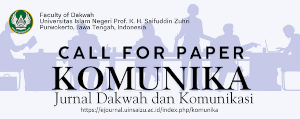GOYANG DANGDUT DAN REPRESENTASI IDEOLOGI DI TELEVISI
DOI:
https://doi.org/10.24090/komunika.v7i1.368Keywords:
Nahdlatul Ulama, Risalah and Religious Radicalism.Abstract
As a genre of popular music, dangdut is part of pop culture entertainment industry.Dangdut has a "community of listeners" , in addition to obtaining maintenance andreasonable award. People no longer question of where such music originated and who actsas the source. But in pop culture it is also defined as "the location of the fight" , wheremany of the meanings defined and debated. It is not enough to underestimate the popculture as only serving to the complement of the system in capitalism and patriarchy,allowing it to anesthetize people with false consciousness.Pop culture can also be seen as the location where the contested meanings anddominant ideologies can be disturbed; between the market and the various ideologies;between investors and producers; between director and actor; between publishers andauthors; between capitalists and workers; among women and men; groups of heterosexualand homosexual; groups of blacks and whites; old and young; between what the meaningof all things, and what it means, a battle of control ( towards the meaning) that sustaincontinously. Thus, finally, in the television, dangdut do not only just offer entertainment,but also the ideologies that continue to be produced and reproduced in the name ofentertainment world called dangdut .Downloads
Download data is not yet available.
Downloads
Issue
Section
Articles
License
Authors who publish with this journal agree to the following terms:
- Authors retain copyright and grant the journal right of first publication with the work simultaneously licensed under a Creative Commons Attribution-ShareAlike 4.0 International License that allows others to share the work with an acknowledgement of the work's authorship and initial publication in this journal.
- Authors are able to enter into separate, additional contractual arrangements for the non-exclusive distribution of the journal's published version of the work (e.g., post it to an institutional repository or publish it in a book), with an acknowledgement of its initial publication in this journal.
- Authors are permitted and encouraged to post their work online (e.g., in institutional repositories or on their website) prior to and during the submission process, as it can lead to productive exchanges, as well as earlier and greater citation of published work (See The Effect of Open Access).
























